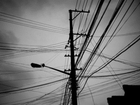TikTok has finalized a deal to create a new American entity, avoiding the looming threat of a ban in the United States that has been in discussion for years on the platform now used by more than 200 million Americans.
The social video platform company signed agreements with major investors including Oracle, Silver Lake and the Emirati investment firm MGX to form the new TikTok U.S. joint venture. The new version will operate under "defined safeguards that protect national security through comprehensive data protections, algorithm security, content moderation and software assurances for U.S. users," the company said in a statement Thursday. American TikTok users can continue using the same app.
 Full Story
Full Story
The vast field of over 5,800 electric and hybrid vehicles gleamed on the cargo deck of the BYD Changzhou, an Chinese container vessel unloading Wednesday at a river port in eastern Argentina.
In other places, such a scene would not be noteworthy. Chinese automaker BYD has sped up its exports and undercut rivals the world over, alarming Washington, upsetting Western and Japanese auto giants and unnerving local industries across Southeast Asia, Africa and Latin America.
 Full Story
Full Story
Japan posted a trade deficit for the fifth straight year in 2025, according to government data released Thursday, as exports were hit by U.S. President Donald Trump's tariffs and a diplomatic rift with neighboring China.
For the full year, Japan logged a 2.65 trillion yen ($17 billion) trade deficit, the Finance Ministry reported in its preliminary data.
 Full Story
Full Story
Powered by strong consumer spending, the U.S. economy grew at the fastest pace in two years from July through September, the government said Thursday in a slight upgrade of its first estimate.
America's gross domestic product — the nation's output of goods and services — rose at a 4.4% annual pace in the third quarter, the Commerce Department reported Thursday, up from 3.8% in the April-June quarter and from the 4.3% growth the department initially estimated. The economy hasn't grown faster since third-quarter 2023.
 Full Story
Full Story
The International Monetary Fund has asked the Lebanese government to amend a banking draft law that would allow depositors to recover their funds and said it can't endorse the draft "as presented".
The law, a key demand from the international community to unblock economic aid to Lebanon, was approved last month by the Lebanese government. It stipulates that each of the state, the central bank, commercial banks and depositors will share the losses accrued as a result of the financial crisis.
 Full Story
Full Story
U.S. President Donald Trump on Wednesday proclaimed his country was the world's "economic engine," and slammed Europe as "not heading in the right direction," as Washington's allies push back against its bid to seize Greenland.
"The USA is the economic engine on the planet. And when America booms, the entire world booms. It's been the history," he said during a speech at the World Economic Forum in Davos, where the Greenland crisis has dominated talks.
 Full Story
Full Story
European Union lawmakers on Wednesday voted to hold up ratification of a major free trade agreement with the Mercosur group of South American countries over concerns about the legality of the deal.
In a vote in Strasbourg, France, lawmakers narrowly approved sending the EU-Mercosur agreement to Europe's top court to rule on whether it is in line with the bloc's treaties. The result was 334 votes in favor to 324 against, with 11 abstentions.
 Full Story
Full Story
The Suliman S. Olayan School of Business (OSB) at the American University of Beirut (AUB), through its Business Practice and Policy Initiative (BPPI), hosted an expert roundtable titled “Restructuring Lebanon’s Banking Sector: Global Standards, Local Realities.” The event gathered economists, bankers, and academics to explore viable pathways for restructuring Lebanon’s paralyzed banking system amid one of the country’s most severe financial crises.
The BPPI, a newly established initiative within OSB, bridges academic knowledge with policymaking to advance evidence-based reform, turning research into actionable insights that support Lebanon’s recovery and strengthen governance.
 Full Story
Full Story
A meeting comprising Lebanese, Syrian, Egyptian and Jordanian officials will be held in February with the aim of facilitating the exportation of electricity and gas from Jordan and Egypt to Lebanon via Syria, a Lebanese ministerial source told Asharq Al-Awsat newspaper.
The meeting will review previous agreements signed during the era of the Bashar al-Assad regime, as part of the Lebanese authorities' steps to improve electricity supply in Lebanon.
 Full Story
Full Story
India and the UAE finalised a series of agreements on Monday, hoping to double bilateral trade to $200 billion by 2032.
The United Arab Emirates president, Sheikh Mohamed bin Zayed Al Nahyan, met with India's Prime Minister Narendra Modi in the national capital as part of a visit aimed at bolstering bilateral and strategic partnership.
 Full Story
Full Story



